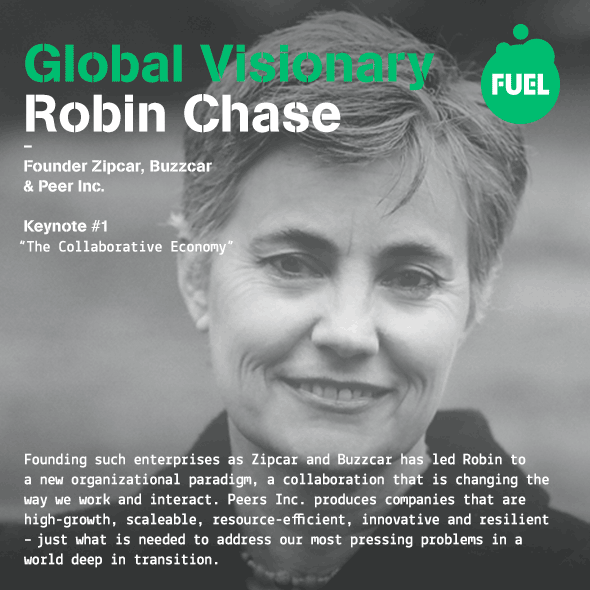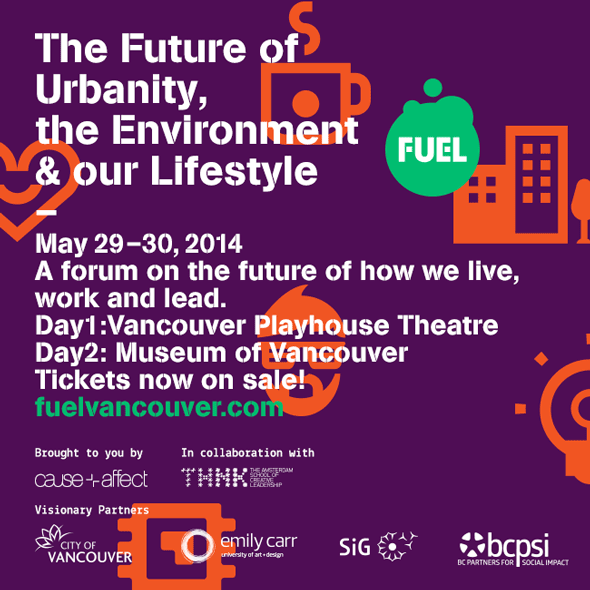Vancouver Is Awesome is a proud sponsor of FUEL - The Future of Urbanity, the Environment and our Lifestyle - a forum on the future of how we live, work and lead.
FUEL will connect innovators from around the globe with local entrepreneurs, designers, engaged citizens and leaders from public, private and nonprofit sectors committed to developing a better world. Created by Cause+Affect and produced in collaboration with THNK, the School of Creative Leadership, FUEL will explore four sectors relevant to our city; Food, Design, Sustainability and Technology.
One of the Global Visionaries that will be participating in FUEL is Robin Chase, Founder of Zipcar, Buzzcar, Veniam' Works and Peer Inc.
Here's short summary of her presentation at FUEL:
The Collaborative Economy
The Sharing Economy continues to gather steam both globally and locally. What could be viewed as a move to more traditional values, is actually a trend leveraging technology like never before and taking advantage of the “excess” that exists in our society. Robin will be sharing a new organizational paradigm, a collaboration that is changing the way we work and interact. Peers Inc. produces companies that are high-growth, scaleable, resource-efficient, innovative and resilient - just what is needed to address our most pressing problems in a world deep in transition. A Peers Inc. organization delivers the speed of collective action while preserving the ingenuity and creativity of individuals. The internet has empowered people. Peers, Inc., takes it up a level with the power of companies.
Q+A's between Jane Cox, FUEL/Cause+Affect and Robin Chase
Jane: Here in Vancouver, we have become quite familiar with carshare, with our own local co-op, Modo leading the way. Can you tell us how you moved from being the Founder at Zipcar to your new European venture Buzzcar?
Robin: I love carsharing. What struck me when I was CEO of Zipcar, and in many years that followed, I would get asked: "How come you haven't put a Zipcar downstairs in my building, or in my neighborhood, or in my city, or at my university?" And the answer would be: because we will only place cars where we feel pretty sure that it will be well used, and we can get an adequate return on that investment.
With Buzzcar, we are letting people rent out their own cars to their friends and neighbors. This means two things. First, it changes the economics. A car owner has already bought and paid for the car. If he/she rents the car once a year, that's great! once a month better and 3x week for fantastic, but all are good. So we have Buzzcar rentals that can happen in very low density places where traditional carsharing or car rental would never be possible.
Secondly, Buzzcar puts the decision to do carsharing in the hands of the individual. If you want to share your car, you can add your car to our network in about 5 minutes. If you want to rent a friends car, you can persuade them to do it. You don't have to wait for a company to make that decision for you. Your car sharing potential is in your own hands.
Jane: You seem to be taking "sharing" to all new levels with your latest venture in Portugal, can you tell us a little about Veniam 'Works?
Robin: Veniam provides secure reliable communications for moving vehicles, as a compliment to cellular networks. Part of what this entails, and how it is relevant to the sharing movement, is that the device in each car creates and shares a wireless network among themselves. Wireless built on the back of a community of shared devices!
Jane: Vancouver is starting to see what is being termed the "social economy" making real impact in certain communities. Besides the obvious financial and convenience aspects of sharing, what other benefits do you see?
Robin: There are two other important benefits. Sharing physical assets -- getting the most out of each and every object -- is an important part of getting to a sustainable economy. We can't get there as long as we keep extracting resources, recombining them, and then dumping them in landfills. Inasmuch as the sharing economy can make it simpler, financially rewarding, and socially desirable to get more value out of assets, this is important and great.
I also think that we have an opportunity to use the sharing economy to build and to strengthen community. Sharing economy companies/services don't necessarily come with this community-building. In order for it to happen, it has to be overtly valued and cultivated. As a world, we are transitioning from an industrial capital economy where resources seemed unlimited, to a world where we recognize that infinite growth is not a possibility. Climate change is already putting pressure on communities and resources, sometimes in abrupt ways. We need to start exercising our community muscle, so that when the going gets tough we have a community muscle reflex and community muscle memory.
Jane: Your new focus is Peer Inc. and you're currently writing a book on this. Tell us how you think this new organizational structure will impact our future?
Robin: I'm very interested in the ways companies, institutions, and governments have to collaborate with people as unique contributors. We are seeing the rise of a new partnership between autonomous individuals and institutions, where each side contributes what they do best. Depending on how we play this future out, it could mean a lot more autonomy and agency for individuals in the way they work, as well as increased value placed on currently unmonetized social intangibles. One dollar is not like every other dollar any more, because these dollars would not be associated with specific people and values.
This Peers Inc. organizational structure also transforms the pace at which we can learn and transform the status quo. And I'm all about fast learning and the ability to evolve quickly. You'll have to come to my talk to hear more.
Jane: What is your most important message for entrepreneurs and business leaders of tomorrow?
Robin: We need you! It is the new entrepreneurs that will change the status quo, not the old guard who have too much to protect.
FUEL Day 1 - $250 includes evening Dialogues and After-party
FUEL Day 2 - $500 includes full day Workshop by THNK
FUEL Day 1+2 - $700
Buy tickets here




